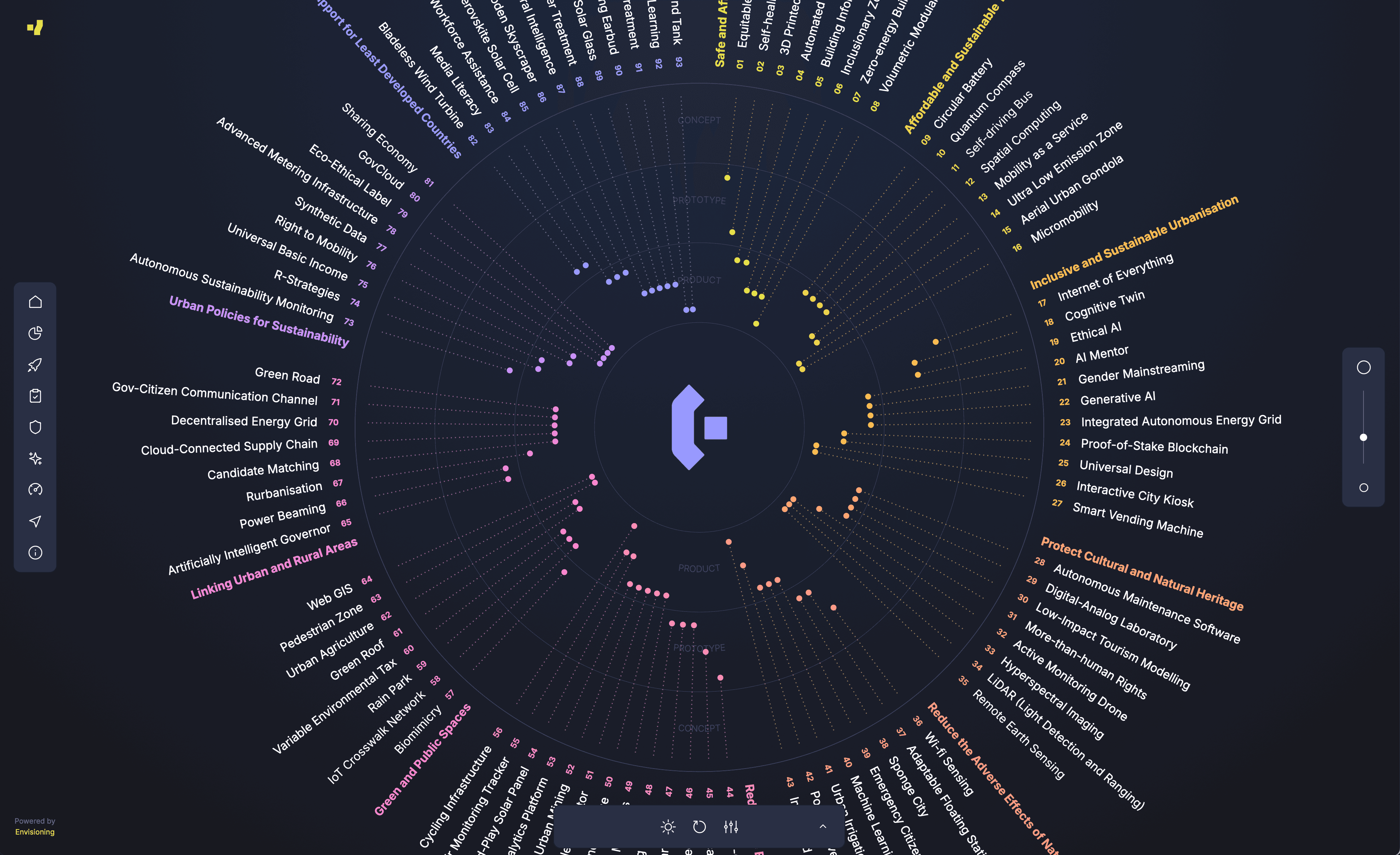Powering Urban Innovation and Imagination

This radar highlights innovative solutions designed to help people imagine and build the future of cities. We focus on SDG11—Sustainable Cities and Communities—to promote inclusive, safe, resilient, and sustainable urban development. By aligning with this globally accepted guideline, we aim to make a meaningful impact on how cities evolve.
This resource is free and open-access, ensuring it reaches decision-makers, politicians, startups, businesses, policymakers, educators, and the public. In this version of the Envisioning Cities radar, we go beyond emerging technologies by including policies, ideas, strategies, concepts, and trends. This broadened focus demonstrates that the future of cities depends on more than just technology; social, political, cultural, and economic shifts play an equally important role.
Our Work
- Developed an interactive AI-powered tool for urban innovation.
- Features 90+ solutions encompassing policies, ideas, strategies, trends, and technologies.
- Enhanced user experience with AI-generated images created with Midjourney.
- Ongoing research with periodic updates.
Impact
- Provides urban planners with actionable insights.
- Free and open-access, this radar can be used by decision-makers, students, educators and citizens.
- Increased potential reach with content and AI-Assistant in English and Brazilian Portuguese.
- Material has been used in workshops and urban innovation classes.
- Supports Sustainable Development Goals (SDG11).
- Tagged for the New Urban Agenda and Resilient Recovery: Building Back Better frameworks.
Envisioning Cities is one of our first AI-powered radars, featuring a GPT-based AI assistant that allows users to ask questions and engage with the content interactively. For instance, users can ask, "What are the most promising sustainable solutions?" Within seconds, the assistant provides a personalized response, highlighting relevant entries.

This project is an ongoing exploration of replicable, high-impact urban innovation solutions, with periodic updates. Hosted on a personalized and intuitive custom CMS platform, the content is based on secondary research and enriched by expert insights from urban innovators and city officials through qualitative research.
The Envisioning Cities radar and AI Assistant are available in both English and Brazilian Portuguese, broadening accessibility and SEO. This multilingual feature also enhances its application in workshops, whether virtual or on-site, such as the Campus Party.
Related Links
nlmtd
Sep 18, 2025
Envisioning Cities: geeft veel specifieke inzichten stedelijke en regionale ontwikkelingen (https://cities.envisioning.io)
Widodo Dwi Putro
Feb 24, 2025
There is no permanent constitutional and political-legal system. Scientists also predict that the phenomenon of the rise of datacracy with big data and algorithms will replace the democratic system. In this research, the author aims to answer the following questions: (i) Why is democracy bound to be replaced by datacracy? (ii) what alternative options can be proposed to bridge the legal and political implications that might occur if datacracy replaces democracy? The author uses literature studies and an interdisciplinary approach to critique and offer ideas in this study. It is proposed, among other things, that datacracy will not eliminate people's sovereignty; instead, it will only narrow down democratic instruments such as people's representatives and political parties because they will no longer be needed. Such representative democracy is likely to become obsolete because the people will be able to actively participate in conveying their aspirations directly, without going through the people's representative system, by inputting their needs, interests, and various problems through the datacracy platform.
Conference
Dec 1, 2022
Designers work, essentially, creating objects, processes and systems to be used by people. In this relation, we can clearly see the presence and influence of design in society, because these objects, processes and systems are responses to human needs and wishes. Many authors like Herbert Simon (1968), Jorge Frascara (2002) and Victor Papanek (1971) include, in the definition of design, the idea of building the non-existent. Building something that doesn't exist situates the designer between the imaginary and what exists, and this is a common position that designers assume in multiple design methodologies, especially in the speculative design. In the practice of speculative design, we investigate future scenarios through design artifacts. Speculative design combines design’s social change power with the expansion of approaches that may arise from discussions and reflective activities about possible futures.